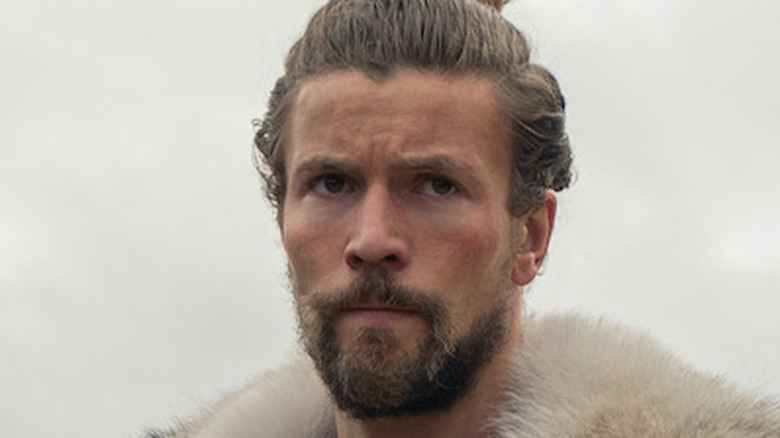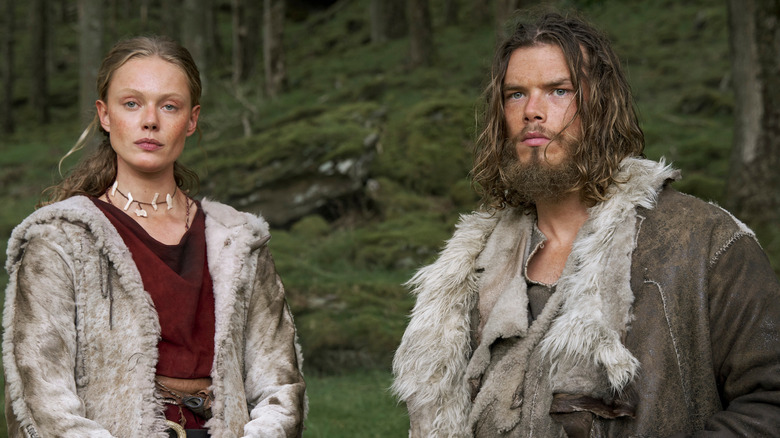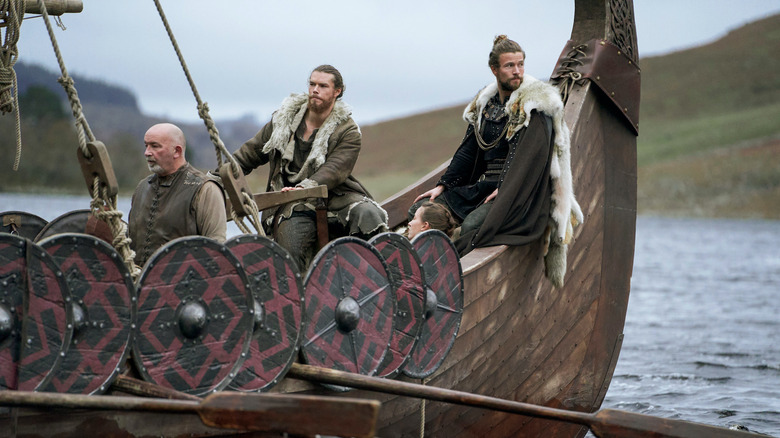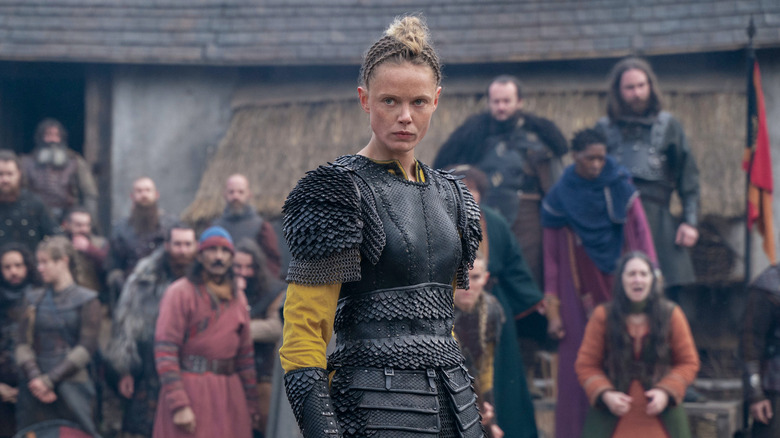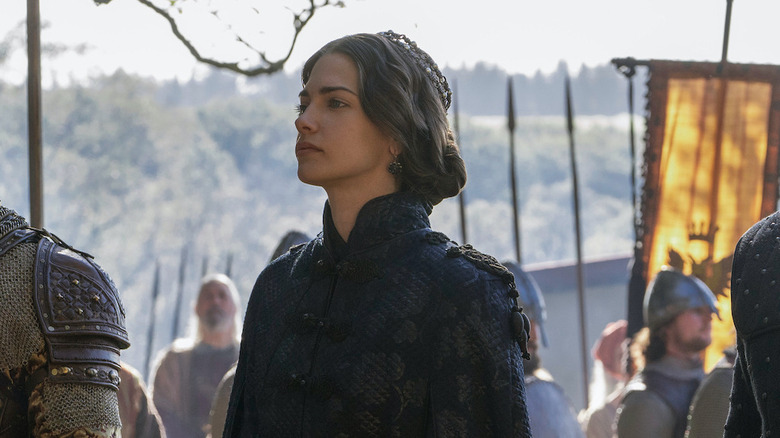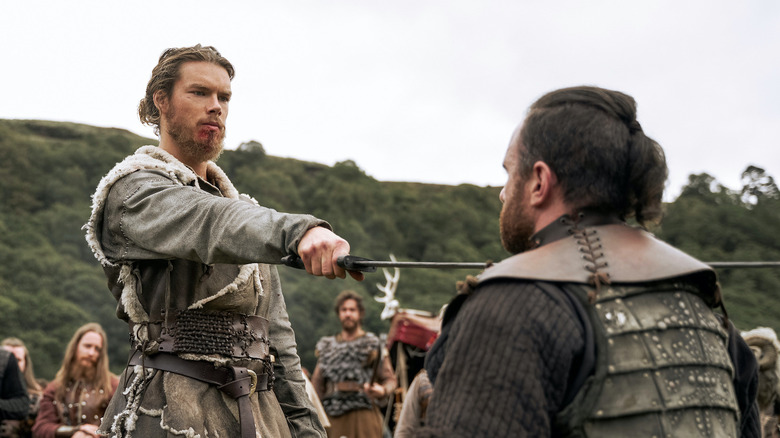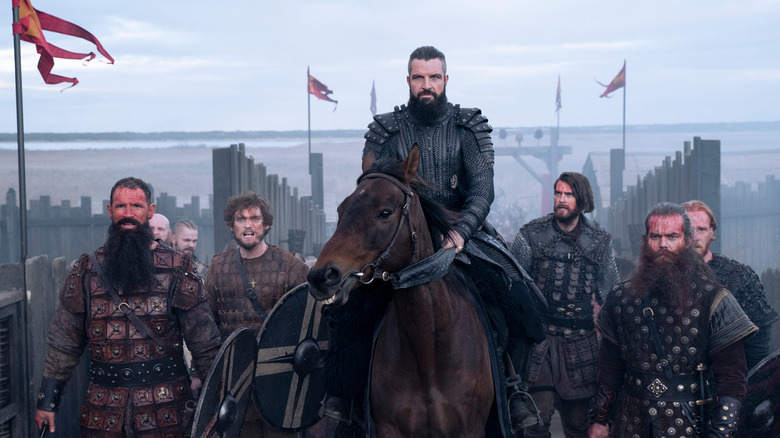Vikings: Valhalla Creator Jeb Stuart Breaks Down His Approach To Bigger Drama And Action - Exclusive Interview
Over six seasons, the TV series "Vikings" told the tale of Ragnor Lothbrok (Travis Fimmel) and his descendants while building an impressive fan following that reveled in the historical action and adventure. Yet, when a spinoff series was proposed, instead of continuing the story of one of the characters from "Vikings," creator Michael Hirst and his fellow executive producers decided to instead find someone to conceive of a new story set in the same universe. That individual is Jeb Stuart, the creator of the "Vikings" spinoff "Vikings: Valhalla."
While Stuart included plenty of elements in the new show that nod to the original, including the epic action and strong characters fans have come to expect, "Valhalla" is a completely separate story set more than 100 years after that of "Vikings." Moreover, the new series incorporates the characters of several well-known Vikings that many learned about in school, including Leif Eriksson (Sam Corlett) and Harald Sigurdsson (Leo Suter).
Although we know their names and some of the things they did, "Valhalla" takes the opportunity to fill in the blanks of these characters' lives while creating a sprawling, historic universe all its own. A veteran screenwriter of eternally popular films like "Die Hard" and "The Fugitive," Stuart has created an engrossing saga filled with gripping action and fascinating characters who are all fighting for what they believe in, whether that's the dominance of the Vikings, their faith in the old Norse religion, the newly introduced Christianity, or the ascendance of England.
In an exclusive interview with Looper, Stuart discussed taking on the challenge of creating the "Vikings" spinoff, his approach to writing satisfying action sequences, how he balanced historical facts and artistic license, and what we can expect from future seasons of "Valhalla."
New show, same universe
How familiar with the original "Vikings" series were you when you took on the challenge of creating this new show in the same universe?
That's an interesting question. I was a fan of the old show. I really was, but there's a big distinction between being a fan where you can enjoy it and luxuriate over it and "ooh" and ahh" about it and stuff like that. Suddenly [now, making the show] it's, "Oh, now you've got to replicate and improve it." That's a totally different animal because then you're like, "Ah, I don't know anything about the Vikings." Six seasons didn't prepare me. I had to go back to school, so to speak, and really learn everything there was. Also, the fact was that ["Vikings" creator] Michael [Hirst]'s Vikings were more of that mythic type of Viking, where it was being, "Ragnar Lothbrok, was he real, was he not real?" We know certain aspects about him.
You get to my Vikings, they're starting to put things on paper. There was a lot of [my] thinking, "Wow, if I was really digging into Harald Sigurdsson, for example, what do I know about him? How do I know what I know about him?" I had to do a lot of research on that, a lot on ["Valhalla" characters] Leif [Eriksson] and Freydis [Eriksdotter]. This is a very cool period to be playing in. It's the final part of the Viking era, so there's a lot of great stories that come out of that era. I'm excited about it.
Writing historical drama
You are known for having written some of the best action movies of all time like "Die Hard" and "The Fugitive." More recently, you've been involved with historical TV dramas — first, Netflix's limited World War II series "The Liberator," and now this. How did your previous writing experience inform the historical dramas you're now focused on?
Well, I've always been a fan of the historical drama. No one was calling me up to write them. Anyway, I'm thrilled to be doing it now. It's interesting, you mentioned "Liberator," I think one of the interesting things about that show in relation to this show is that, even though that took place in World War II, the telling of those stories varied from 1945 to — I think Felix Sparks [whose memories of his wartime experience were the basis for "The Liberator"] died in the 2000s — he told that same story multiple times and it changed every time he told it.
When I got to "Valhalla," I allowed that to inform me. In other words, we don't really know the full story. We know that Harald went on this incredible journey throughout his life. We know that Leif Eriksson went to the new world. How did he do it? What motivated him to do it? That's the gray area that I've learned from these shows to enjoy, to play in, to research, to focus on that part of it.
Everything comes back to character
The action sequences in "Valhalla" are unbelievable. Did your previous experience writing action sequences in movies help you imagine these new scenes? Or was the scope something that required a completely different approach?
No, all of [those, including] "Die Hard," they're character-based action. It's not action for the sake of action or "we need a big set piece here," it's that this particular character required that or needed that. Whether it's Freydis in Episode 3 when she fights the Berserker — by the way, I lose about a hundred calories every time I watch that scene, because I feel like it's going to end differently. Something like [Episode] 4 with the London Bridge episode was a challenge from both the writing aspect as well as the action aspect, because all the main characters that we've been building to this point now have to exist in the same scene, in the same episode. For me, that's an incredible challenge both from the dramatic aspect, as well as the action aspect, as well as the visual effects aspect, and all those little pieces.
Tons of credit goes to ["Valhalla"'s] Irish crew who can do just about anything. Credit goes to one of the best stunt coordinators I've ever worked with in Richard Ryan, and I've worked with lots of stunt coordinators, but Richard gets what the script is trying to say with the character's actions. In other words, it's not like, "I know what the script said, but I've got this cool kung fu move and..." They didn't do that, so why are you bringing that to the table?
I'm trying to say, [with] 35 years of experience in this business, I've worked with some really wonderful people, but I've tried to bring all the good stuff together in a show like "Valhalla." I think it shows. I love the action and I love the character action, but you can't love character action unless you love the character. Otherwise, it's just a stunt.
Playing in the 'gray area' of history
Was there a process that you followed to strike a balance between historical accuracy and taking creative liberties?
When we say the historical accuracy, I went into it with that idea, which is, we know a lot about, let's say, Emma of Normandy [who's a character on the show]. When I started digging into what we know about Emma of Normandy, a lot of what we know is because she hired her own biographer and told her story. I wanted to take a step back from that and say, "Wait a minute, who was that young girl who came over from Normandy?" [She], by the way, was related to Rollo [a Viking and the first ruler of Normandy] and related to the Vikings. The Normans are the Normans because that was the area of France that was given to the Northmen. She has a connective tissue to the north.
She came over as a teenager, and by the time she was in her 20s, she was one of the richest women in Europe. How the hell did she do that? That's not reflected in some of her biography, so there must be some good stuff in there. You try to dig deeper in that and when you [find out] there's nothing there, you try to play in the gray area, knowing what you know about the historical period of the time.
A story that speaks to today
"Valhalla" deals with the divisions between the English and the Vikings, and then within the Vikings, between the Christians and the so-called pagans. What were you hoping to communicate through that story?
We can look, especially — we don't have to pick on the United States, but let's do it. Let's say, we get into these ideological differences of right and left or Republican, Democrat and everything. When attacked, suddenly America always seems to put aside their ideological differences and they become Americans. We're in a period of time right now, where it's real easy to not have any middle ground. "You're either with us or you're against us. You're either on our side or you can't be." There's no moderation now, which I always think is a very dangerous territory to be. That's where the Vikings were.
I particularly picked this period because I felt like it was a time where the pagans were under attack from the emerging Christianity at the time and the fighting was tooth and nail, and yet when they were attacked, they put aside their differences and went and became Vikings again. That was a really cool moment for me. That's something we always, as societies, should remember. We should remember that we have more in common than our differences — well, that sounded like a real cliché, but we do have more in common than our differences. Hey, you're talking to a cliché guy, sorry about that. [Laughs]
A glimpse at what's next
Netflix gave the series a 24-episode order, which will take it to three seasons. Can you tease anything about where the characters will go after the events of Season 1?
I can tell you that if you follow the Harald Sigurdsson story, you know that he didn't just become the king of Norway. We do know that he did eventually become that, but he went on a long journey from that point. That's an interesting tease of where we're going to take these Vikings. We're going to take them out of Scandinavia. We're going to broaden that story because that's exactly where their stories went.
We always know that Leif Eriksson and Freydis ended up in the new world, but why did they go to the new world? What drove them? He didn't get lost in a boat. I want to explore some of those type of things. There's some really great stories that you'll see, and especially in Season 2, of how we get the tools in the toolbox to go do some of these things.
This interview was edited for clarity.
The eight episode first season of "Vikings: Valhalla" premieres on Friday, February 25 on Netflix.
